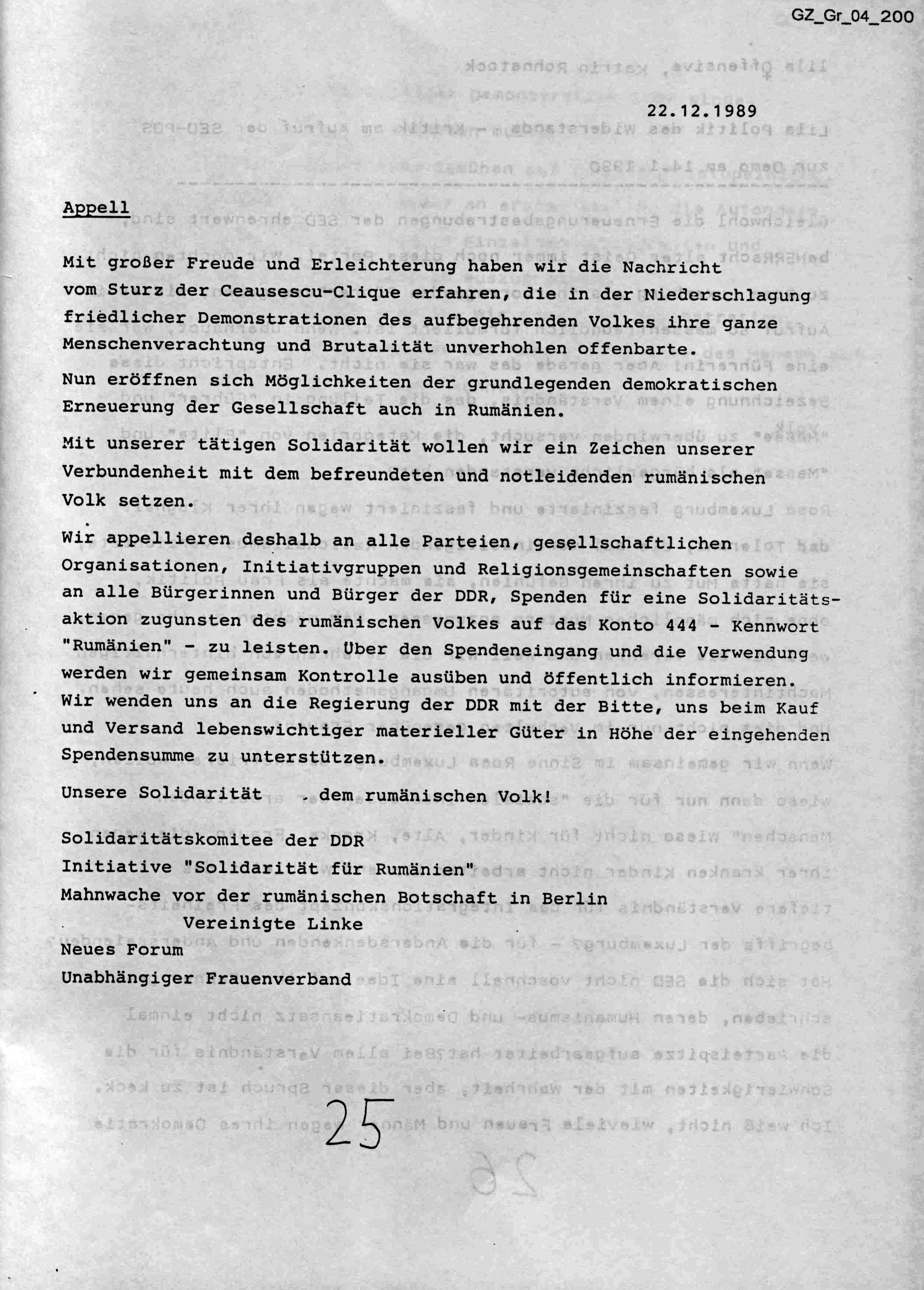Elske Rosenfeld, Statements for the Future, Performance/Video, 15 min, 2019/2022
Material: declarations, manifestos, and lists of demands put forward by working groups and individuals, dissidents, artists and cultural workers, labour unions, women’s groups, as well as gay and lesbian organisations in the GDR in the autumn and winter of 1989/90. Performances recorded on 9 November, 2019, the 30th anniversary of the Fall of the Berlin Wall, at Sala Omnia, a former assembly space of the Romanian Communist Party in Bucharest and on 30 April 2022 in the old water reservoir in Berlin Prenzlauer Berg.
To express thoughts or feelings to convey information in speech or writing; to convey information or ideas in text; to engage in conversation; to say with the voice, pronounce or utter; to express in words, to tell. Also, to speak out: To talk freely and fearlessly, as about a public issue. To speak up: to speak loud enough to be audible; to speak without fear or hesitation. From Middle English speken, from Old English sprecan, specan. In old Slavic, the word for speaking is vět-iti or věťati, which also means „to inform", to „say“, to „speak“. It is related to větъ (“agreement”), věťe (“assembly”), otъvěťati (“to answer”), oběťati (“to promise, to pledge”), as well as the Slavic věst ("news"), the English wise, the root in ad-vis-or, the Dutch weten or the German wissen (“to know”). Combined with the prefix so-, from old Slavic su- („together“) it also forms the root of the word “soviet.” Philosophers like Boris Groys and Maurice Blanchot have described the exercise of collective speech as the essence of the “unideological communism” of revolution.
SPEAKING is a collaboration with contributions by Anna Zett, Ink & Ziz (D'EST & Fehras Publishing Practices), Luise Schröder and Suse Weber who were invited to repond to one or several of the materials. Excerpts of video footage by Horst Podiebrad, Wittenberge 1989 were edited by Elske Rosenfeld.
1
It is with great pleasure and relief that we received the news that the Ceausescu-Clique has been toppled. Their repression of the peaceful protests of the insurgent people has once more exposed their brutality and contempt for their people.
In Romania, the possibility of a fundamental democratic renewal of society is now open.
We extend our active solidarity, as a sign of our connection with our friends, the suffering Romanian people.
It is with great pleasure and relief that we received the news that the Ceausescu-Clique has been toppled. Their repression of the peaceful protests of the insurgent people has once more exposed their brutality and contempt for their people.
In Romania, the possibility of a fundamental democratic renewal of society is now open.
We extend our active solidarity, as a sign of our connection with our friends, the suffering Romanian people.
2
In this last month of the year 1989, we raise our voice.
In this last month of the year 1989, we raise our voice.
3
We are stepping out of our roles.
The situation in our countries forces us to.
We are stepping out of our roles.
The situation in our countries forces us to.
4
In our country the communication between state and society is clearly broken.
In our country the communication between state and society is clearly broken.
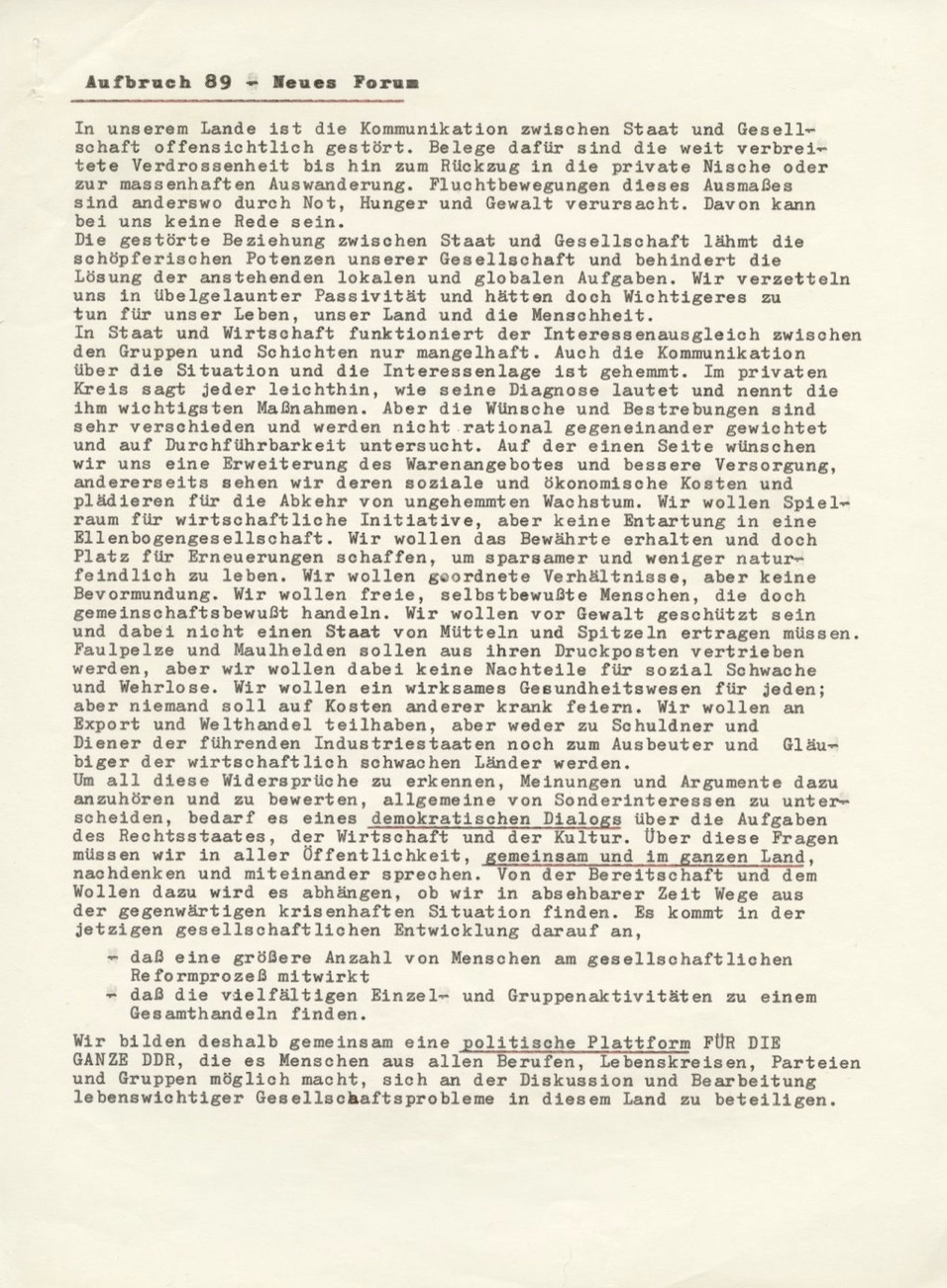
5
The 40th anniversary of the existence of this country is a good reason to begin a far-reaching, open and public discussion.
We must overcome a ritualization of our political language which no longer conveys its intended meaning.
The 40th anniversary of the existence of this country is a good reason to begin a far-reaching, open and public discussion.
We must overcome a ritualization of our political language which no longer conveys its intended meaning.
SUSE WEBER
RAL 6024
Bildvokabeln und akustische Bausteine, Video, 5:22 min
Auslöser für die Auswahl meines Beitrages ist die Nachricht über die Auflösung des Kulturrates der Stadt Leipzig (parteiübergreifend!) am 18.10.2023, betitelt als “Beerdingungs-Vorlage”. Der Kulturrat war eine Schnittstelle für Lokalpolitik und KünstlerInnen. Auflösung eines demokratischen Bausteins 2023! Zweiter Aspekt ist der Umgang mit Jurybesetzung für Wettbewerbe für KünstlerInnen in Leipzig, hier Übergewicht von Verwaltung und HistorikerInnen. Dazu werde ich u.a. sprechen und mithilfe einer Szenografie ein Machtverhältnis nachvollziehbar rekonstruieren. In den drei Sequenzen werden Klanggewinnung demonstriert, Score/Zeichnungen/Entwürfe meines gegenwärtigenArbeitsstandes und im Wechsel dazu 3-D-Aufzeichnung von Szenografie und Publikumsbewegung durch meine Textbeiträge/Rede/Demonstration begleitet.
Dauer der Live-Präsentation: 20 min.
Ablauf: 3 Sequenzen in Kooperation mit Studio Cassis B (“Klanggewinnung durch Biodatensonifikation, oder: Pflanzen können singen”) und Vanessa Amoah Opoku (Raum- und Publikumserfassung, 3-D-Scan Verfahren als Respondentin).
VeranstalterIn: Dialog - watch me work #2, You Are Warmly Invited - Initiative für Reflexion und Feedback zu Arbeitsständen aus den Performing Arts
30.11.2023
Stadtbibliothek Leipzig
RAL 6024
Bildvokabeln und akustische Bausteine, Video, 5:22 min
Auslöser für die Auswahl meines Beitrages ist die Nachricht über die Auflösung des Kulturrates der Stadt Leipzig (parteiübergreifend!) am 18.10.2023, betitelt als “Beerdingungs-Vorlage”. Der Kulturrat war eine Schnittstelle für Lokalpolitik und KünstlerInnen. Auflösung eines demokratischen Bausteins 2023! Zweiter Aspekt ist der Umgang mit Jurybesetzung für Wettbewerbe für KünstlerInnen in Leipzig, hier Übergewicht von Verwaltung und HistorikerInnen. Dazu werde ich u.a. sprechen und mithilfe einer Szenografie ein Machtverhältnis nachvollziehbar rekonstruieren. In den drei Sequenzen werden Klanggewinnung demonstriert, Score/Zeichnungen/Entwürfe meines gegenwärtigenArbeitsstandes und im Wechsel dazu 3-D-Aufzeichnung von Szenografie und Publikumsbewegung durch meine Textbeiträge/Rede/Demonstration begleitet.
Dauer der Live-Präsentation: 20 min.
Ablauf: 3 Sequenzen in Kooperation mit Studio Cassis B (“Klanggewinnung durch Biodatensonifikation, oder: Pflanzen können singen”) und Vanessa Amoah Opoku (Raum- und Publikumserfassung, 3-D-Scan Verfahren als Respondentin).
VeranstalterIn: Dialog - watch me work #2, You Are Warmly Invited - Initiative für Reflexion und Feedback zu Arbeitsständen aus den Performing Arts
30.11.2023
Stadtbibliothek Leipzig
6
Those who equate Socialism with brutal party rule, the disenfranchisement of the people, state property of the means of production and a regime of centralised planning, those who thought that a more just society could be achieved with such means, are so clearly wrong that our only response can be a clear “No”.
Those who believe that we must therefore leave behind the ideal of social justice, of international solidarity, of support for everyone in one’s own society and the whole world – are just as wrong.
Those who equate Socialism with brutal party rule, the disenfranchisement of the people, state property of the means of production and a regime of centralised planning, those who thought that a more just society could be achieved with such means, are so clearly wrong that our only response can be a clear “No”.
Those who believe that we must therefore leave behind the ideal of social justice, of international solidarity, of support for everyone in one’s own society and the whole world – are just as wrong.
7
We have the duty to define the word socialism in such a way that it once more becomes an acceptable idea.
Socialism’s dawn was nothing more than the embers of a dying fire. But although Socialism is dead, before it began to live, its original ideas cannot be simply discarded.
Despite all the devastating criticisms made of this socialism – of its health and educational systems, its work lives, the forms of collective life, the lack of perspectives for individuals and the whole society, it is clear that people do not want capitalism either... They want something new, something different.
Stand up, move, but not to the West, to the streets! Any solution to our problems that does not involve us will be one in which we once again pull the short straw.
Only we can decide our future.
We have the duty to define the word socialism in such a way that it once more becomes an acceptable idea.
Socialism’s dawn was nothing more than the embers of a dying fire. But although Socialism is dead, before it began to live, its original ideas cannot be simply discarded.
Despite all the devastating criticisms made of this socialism – of its health and educational systems, its work lives, the forms of collective life, the lack of perspectives for individuals and the whole society, it is clear that people do not want capitalism either... They want something new, something different.
Stand up, move, but not to the West, to the streets! Any solution to our problems that does not involve us will be one in which we once again pull the short straw.
Only we can decide our future.
Bärbel Bohley, introduction to the Samizdat “40 Jahre DDR und die Bürger melden sich zu Wort”;
September 1989
September 1989
8
We have the Chance to begin something new:
- self-management in our factories and society as a whole
- a self-determined life in solidarity
- responsibility and participation for all.
We have the Chance to begin something new:
- self-management in our factories and society as a whole
- a self-determined life in solidarity
- responsibility and participation for all.
9
As lesbians, gays and people who still adhere to the imperative of our old friend Marx, that we “must rid ourselves of all conditions that humiliate, enslave, isolate and denigrate humans, we connect the struggle for comprehensive human emancipation with the fight for a liberated love and sexuality.
As lesbians, gays and people who still adhere to the imperative of our old friend Marx, that we “must rid ourselves of all conditions that humiliate, enslave, isolate and denigrate humans, we connect the struggle for comprehensive human emancipation with the fight for a liberated love and sexuality.
Wir haben gesehen, zu jeder Zeit gab es eigene Formen von Widerspenstigkeit.

LUISE SCHRÖDER
What Remains
Research fragments and video, 1 min.
What Remains
Research fragments and video, 1 min.
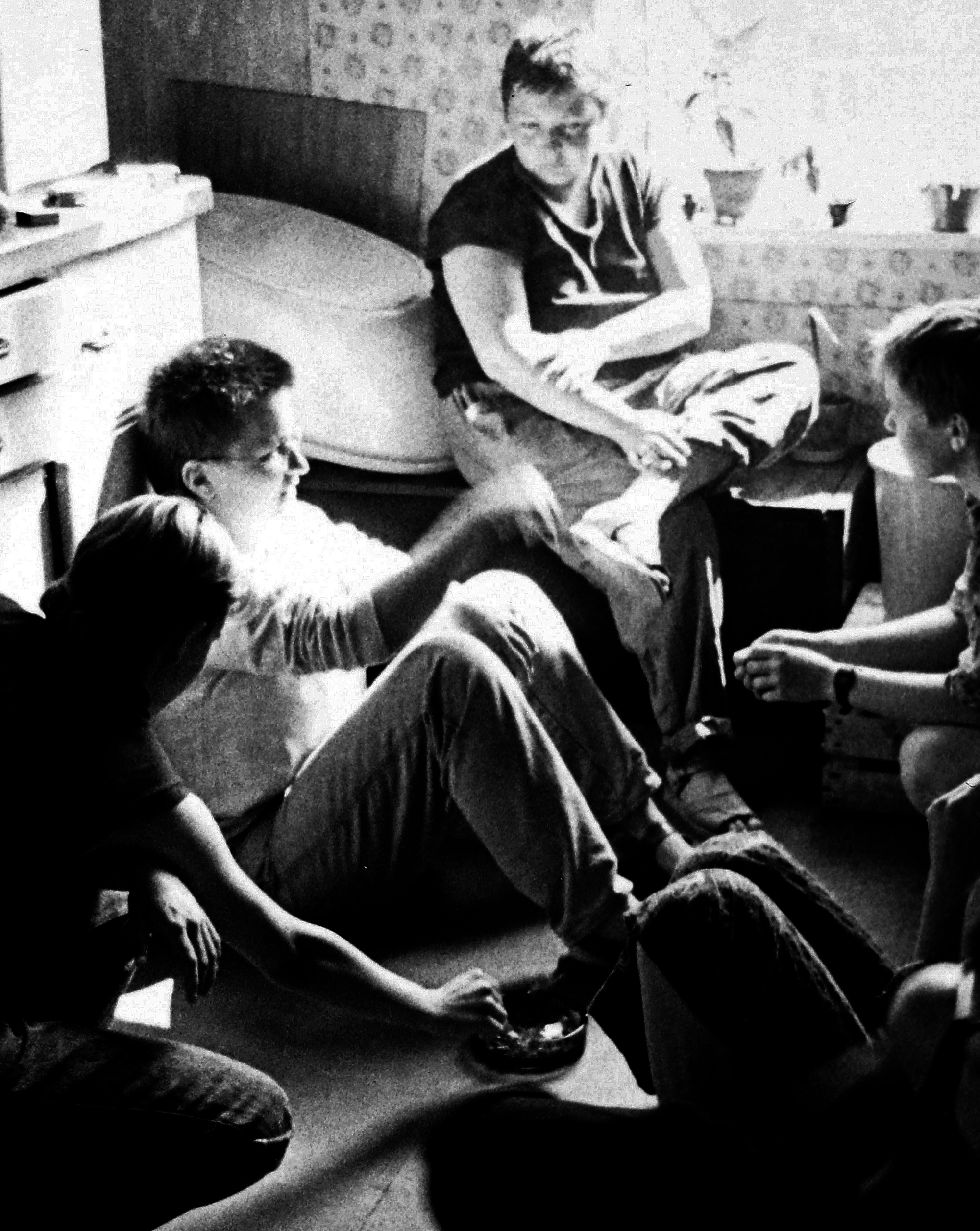
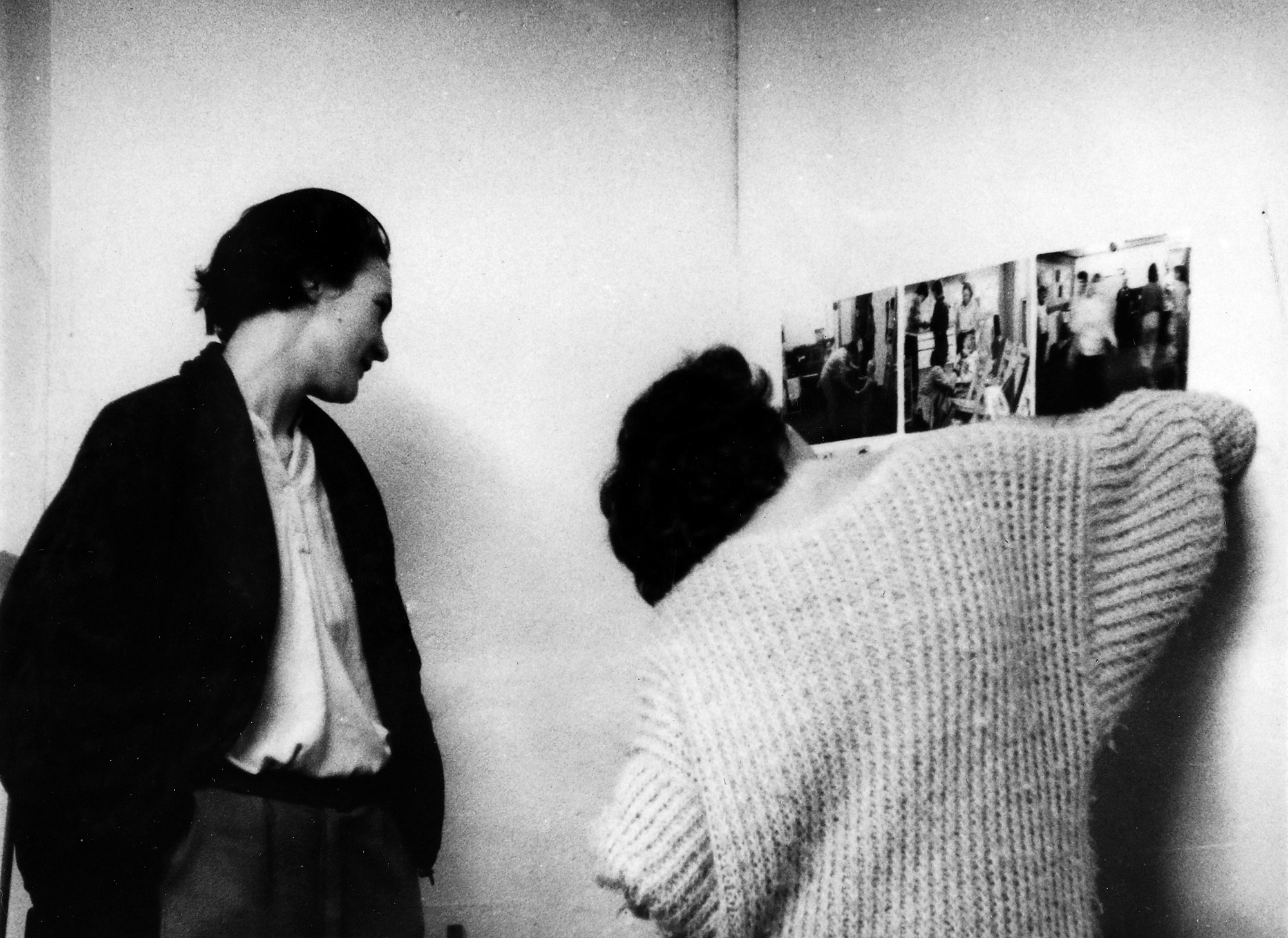
Wir sind nicht vergessen worden, wir sind kein Randproblem, wir sind mittendrin!


Ich sage es gibt kein Dokument. Es gibt keine wirklich sachliche Darstellung, wovon auch immer.
10
As women, making up half of society, we must not miss this chance of a socialist resurgence!
We are tired of being assigned a social niche by male power structures. We do not need special committees, panels, tasks forces that are mere add-ons to government and often turn into mere talking shops.
What we need is concentrated political power at the heart of government and our fair share of decision making power.
We call on all intelligent, brave, creative, active, shy, hesitant and rebellious women and, of course, male sympathisers to start our “first female uprising”.
The revolution is female!
Join together into a strong, combative, solidary collective of women, and to voice through this autonomous union a clear female voice within the democratic coalition of all social forces:
- a female voice whose demands have been formulated from the bottom up in order to express the interests of all women
Let’s give ourselves this voice now!
Let’s leave the social margins to which male domination has confined us.
It is our only and last chance!
Ich kann und will das nicht mehr isoliert sehen. Weil ich mich nicht heraushalten will, wenn etwas in Gang kommt in diesem Land. Und weil ich es dringend notwendig finde, daß wir unsere Kräfte finden, um als Frauen auf neue Art Politik zu machen.

...ökonomische und die gesellschaftspolitischen Strukturen sehe ich nicht als einen Fehler an. Das ist sicherlich gut gewesen, das zu machen, aber es ist mir jetzt zu eng.
I: Denkst Du, dass Du damals das Gefühl hattest, es könnte grundsätzlich etwas verändert werden?
EL: Ja, klar hatten wir eine gewisse Hoffnung. Eine gewisse Hoffnung haben wir ja schon gelebt, sicher. Wir haben ja auch in anderen Zusammenhängen, jetzt nicht nur mit Frauen oder so, immer an diesem Gedanken der konkreten Utopie gearbeitet. Das war immer ein Thema für uns, ein ganz wichtiges Thema. Über all die Jahre eigentlich, die ganzen 80er Jahre war das eigentlich immer das, was wir mit im Auge hatten. Und warum wir auch, was weiß ich, uns mit anderen psychologischen Konzepten beschäftigt haben, den Reich gelesen haben oder auch versucht haben zu analysieren. Das stand alles immer so auf diesem Hintergrund einer konkreten Utopie für diesen Staat, in dem wir uns nun wieder gefunden haben. Das ist jetzt für mich erstmal ziemlich flöten (gegangen). Jetzt kann ich also auch die Wessis besser verstehen mit ihrer -- Halbsehnsucht immer, zumindest aus meinem Bekanntenkreis, in die DDR zu kommen. Aber eigentlich nicht da leben zu wollen, aber doch eben zu spüren, dass da irgendwas noch ist, was Hoffnung machen kann.
I: Dass es noch eine Utopie gibt, ja.
EL: Die, die ich so kenne, haben auch fast alle nicht mehr mit irgendeiner Utopie gelebt und da drunter gelitten, mehr oder weniger bewusst (lacht).
11
We propose to have these discussions from the bottom up.
We propose to have these discussions from the bottom up.
12
No questions of relevance must be left unaddressed.
No questions of relevance must be left unaddressed.
Declaration of the Academy of the Arts of the GDR;
4 October 1989 (continued)
4 October 1989 (continued)
ANNA ZETT – SPEAKING WITHIN
HD Video, 17 min, 4:3
Postsocialist Group Improvisation is a participatory format created in a collaborative artistic research by artist/ writer Anna Zett and dancer/ choreographer Hermann Heisig and various co-researchers in Berlin 2020-21. It involves a 5x5 playing field with modified chairs and a set up of adjustable music and light. It begins with a mutual introduction round, followed by a warm-up and an explanation of the rules of the score.
With an initial focus on East-Germany, it was developed to reembody and diversify the memory of the Former East, which is often trapped in ideology and blocked by hard, unspoken feelings.
After the russian invasion of Ukraine, we decided to host a series of so called assemblies in English with an explicit invitation to people from both Ukraine and russia, as well as anyone else connected with the Postsoviet world.
Except for the drawings made by participants as part of the score, the 90 min group improvisation is neither guided, nor documented audio-visually. It is followed by a reflection round, where everyone is invited to come up to a single microphone to speak about their recent experience.
13
Try to gain clarity about your interests. Try to figure out where your thinking is guided by rational thought and where it is guided by feelings.
Feelings are just as important as rational thinking. But rational arguments are easier to weigh against each other.
Formulate proposals that are suited to changing things in the desired direction.
Start speaking. Make an effort to speak clearly and concisely.
Work in Groups. Check arguments. Learn to speak to the point.
Lose your fear of approaching those in power.
Try to gain clarity about your interests. Try to figure out where your thinking is guided by rational thought and where it is guided by feelings.
Feelings are just as important as rational thinking. But rational arguments are easier to weigh against each other.
Formulate proposals that are suited to changing things in the desired direction.
Start speaking. Make an effort to speak clearly and concisely.
Work in Groups. Check arguments. Learn to speak to the point.
Lose your fear of approaching those in power.
Proposals for a grass-roots democratic approach, New Forum;
23 October 1989
23 October 1989
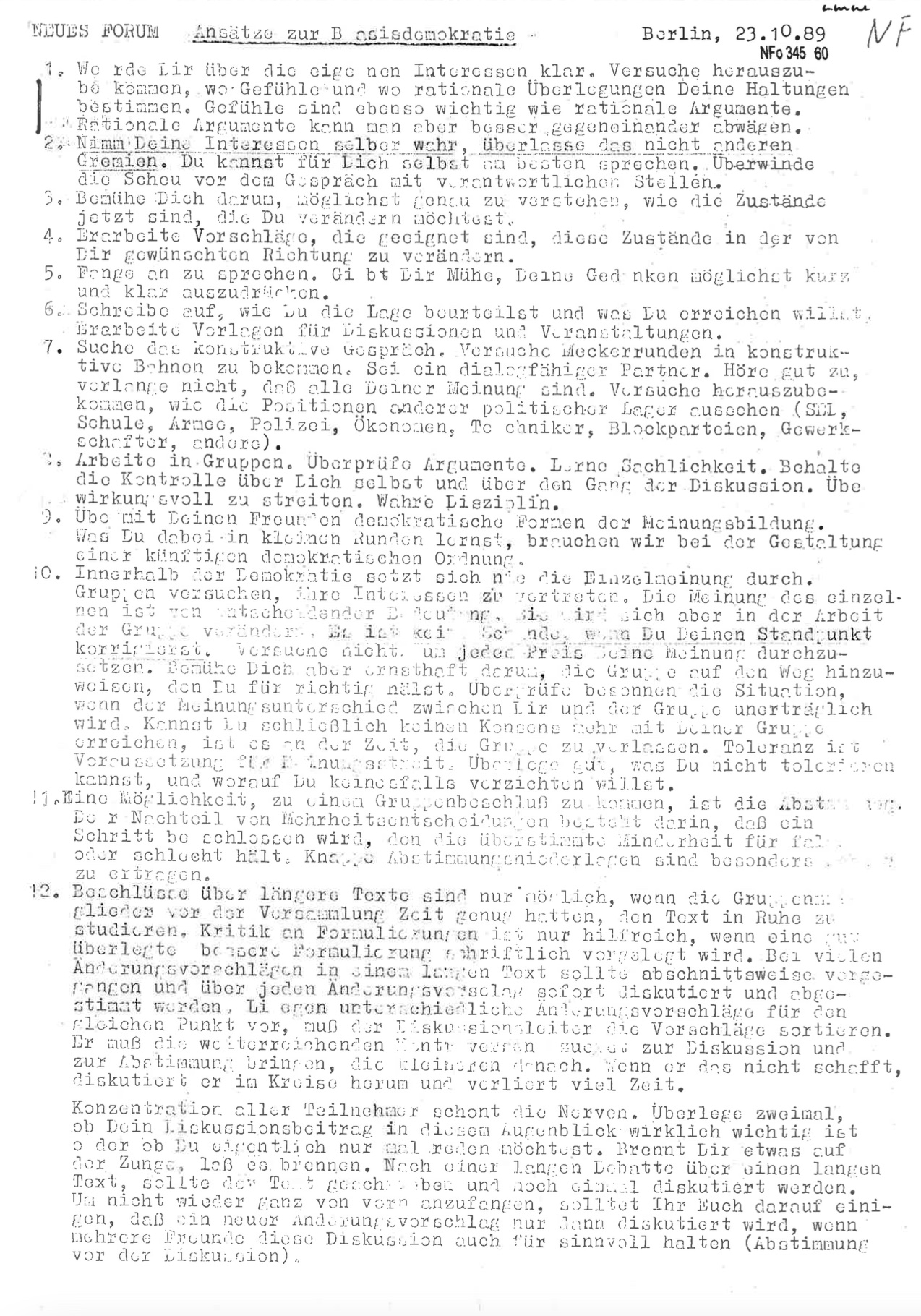
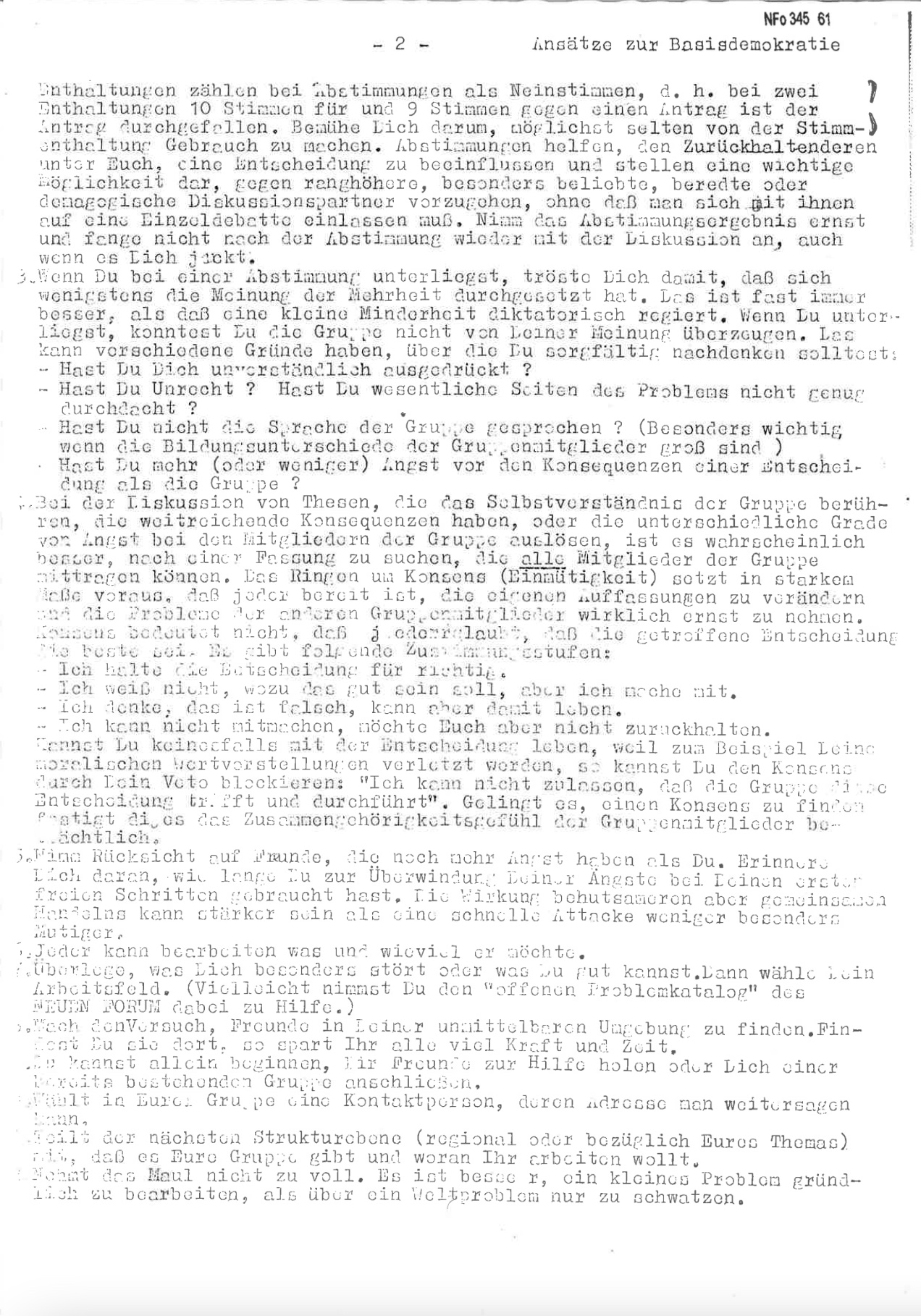
14
This is our Republic!
This is our Republic!
15
Freedom can only be won in a battle, a revolution or reformation. But the loss freedom is never sudden. It never ends unexpectedly or in an instant. Freedom dies by the millimetre. And each one of us is responsible for at least one such millimetre.
Freedom can only be won in a battle, a revolution or reformation. But the loss freedom is never sudden. It never ends unexpectedly or in an instant. Freedom dies by the millimetre. And each one of us is responsible for at least one such millimetre.
For I have given a tongue to every link in my chain. speaking 526400 square milimetres of freedom
seven fragments by ZIZ, the cicada of archives, and INK, a socialist alchemy in yellowing pages, with Fehras Publishing Practices’ collection of the literary quarterly magazine LOTUS: Afro-Asian Writings (1968-1993) published by the Permanent Bureau of the Afro-Asian Writers Association ︎︎︎
speaking from first Lotus
Faiz A. Faiz, Gabriel Okara
in LOTUS 1-1968
i am a socialist alchemy in yellowing pages
i am the ink in no: 59-1988 lotus
printed in the GDR, i will not yet tell you where
or how i was made
black like the coal dust from Schwarze Pumpe
entering every pore of life in my grandmother’s
Plattenbausiedlung
i reach into the paper, through the paper into your hands
your eyes that walk my shapes, into your nose and
all the tongues who speak and lick images and words
i am a material way of transforming language and visions
into signs and smells
so they travel
Faiz A. Faiz, Gabriel Okara
in LOTUS 1-1968
[ziz and ink read out loud together]
LOTUS: Afro-Asian Writings, issue no. 1, 1968
For I have given a tongue to every link in my chain.
Faiz A. Faizand the elders in their insides turned the spoken words over and over, and looked to see the road to take to pass over this inside smelling thing.
from Gabriel Okara: Okolo or The VoiceKnow that you are a witch be. You cannot thus speak to us in the old times.
from Gabriel Okara: Okolo or The VoiceLOTUS: Afro-Asian Writings, issue no. 1, 1968
i am ziz,
my heart inhabited the archives,
i am the cicada of the archives,
i listen to fairies,
and fly,
like a buraq,
i fly,
from the river to the sea,
purple harvests of timeless time,
bunches of Lotus,
poetry, songs and dances,
covers, letters and aromas,
spread into coming greeny fields
my heart inhabited the archives,
i am the cicada of the archives,
i listen to fairies,
and fly,
like a buraq,
i fly,
from the river to the sea,
purple harvests of timeless time,
bunches of Lotus,
poetry, songs and dances,
covers, letters and aromas,
spread into coming greeny fields
i am a socialist alchemy in yellowing pages
i am the ink in no: 59-1988 lotus
printed in the GDR, i will not yet tell you where
or how i was made
black like the coal dust from Schwarze Pumpe
entering every pore of life in my grandmother’s
Plattenbausiedlung
i reach into the paper, through the paper into your hands
your eyes that walk my shapes, into your nose and
all the tongues who speak and lick images and words
i am a material way of transforming language and visions
into signs and smells
so they travel
hungry eyes, or, the ungendered fighter
author/s to be found
in LOTUS 26-1975
ziz: Important to say that this issue is a special release because it is not only dedicated to the Vietnamese revolution but also reviving memories of Afro-Asian Solidarity Movement from Bandung Conference in 1955 through its different trajectories, meetings, conferences and activities.
This is the poem about the ungendered fighter.
[Reads and translates spontaneously]
They are not men
They are not women
They are not girls and boys
But they are crooked trees
They are not men
They are not women
They are not girls or boys,
But mobile lumps of clay
From fertile soil
︎︎︎
This is the poem about the ungendered fighter.
[Reads and translates spontaneously]
They are not men
They are not women
They are not girls and boys
But they are crooked trees
They are not men
They are not women
They are not girls or boys,
But mobile lumps of clay
From fertile soil
︎︎︎
The Booby-Trapped Poem
Samih Al Kassem
in LOTUS no. 59-1988
Samih Al Kassem
in LOTUS no. 59-1988
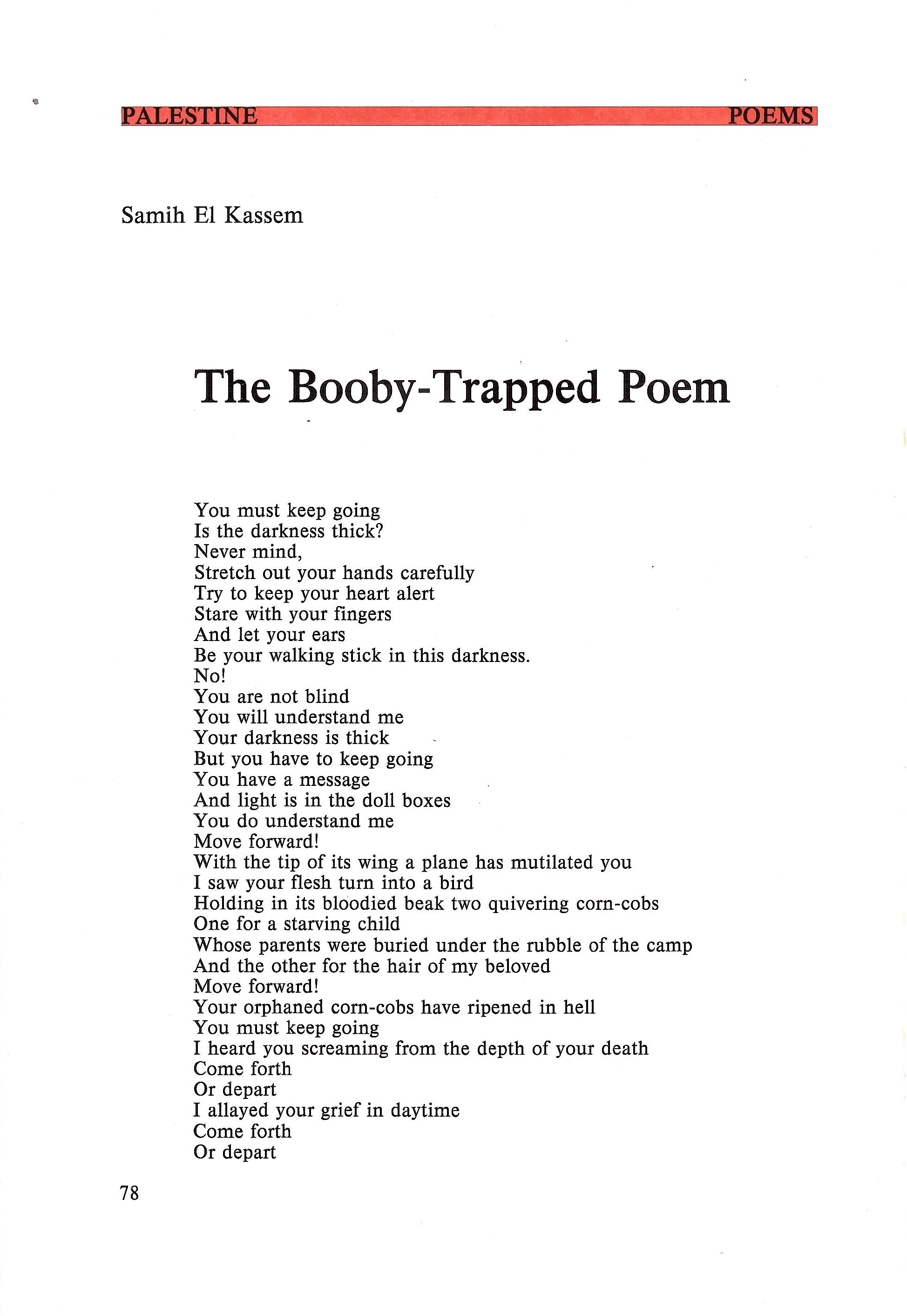
ink: “The Booby-Trapped Poem” by the Palestinian poet Samih Al Kassem was published in Lotus issue no. 59 in 1988. This issue was printed in the GDR, it could have been the last of the Lotus issues printed in the GDR. When the country disappeared, so did these printing arrangements that were part of state solidarity policies, I imagine. Samih Al Kassem associated his birth with the Nakba in 1948, he said: “While I was still in primary school, the Palestinian tragedy occurred. I regard that date as the date of my birth, because the first images I can remember are of the 1948 events. My thoughts and images spring from the number 48”. He was also a poet who refused to leave Palestine. The poem is very long. It goes from page no. 78 to page no. 89. Many many millimeters.
ziz: Samih Al Kassem was a poet from the Palestinians who stayed in their land and took a different path of resistance to those who were expelled from their homes. With them the literature of occupied Palestine was born and grew.
I will come back, yesterday
I will return yesterday from my travels
And rain will go back into the clouds
And you will return to me yesterday
I will return yesterday from my travels
And rain will go back into the clouds
And you will return to me yesterday
ziz: It is also powerful to stop here on the right of return.
ink: It’s like time travel. Death is not the end, or maybe only the end of linear time. The time of murdering does not make the future even if it leaves everything changed, broken. I like the part where it says
.
I must go on
My darkness is thick
You must keep going
Your darkness is thick
The Sun goes from West to East
And the roots of my soul have spread out in space
And in the depths of oil wells
My darkness is thick
You must keep going
Your darkness is thick
The Sun goes from West to East
And the roots of my soul have spread out in space
And in the depths of oil wells
Has the planet started to move the other way around? Everything changes with trauma and the brokenness that comes with too much violence. Time and geography change.
︎︎︎
︎︎︎
hands opening upwards
author/s to be found
in LOTUS no. 26-1975
ziz: I'm touching, you know, the magazine. I'm using my hands. Here. Yeah. The two hands. They are connected, but they have something free, upwards moving, embracing the air. They are talking about machines and planets in the poem and time. I see waves here.
ink: They could also be clouds. Or planets. Does this refer to the space race? Maybe a non-aligned kind of reclaiming of the cosmos?
ziz: Reclaiming the cosmos and bringing back the power to the labor. Time is in our hands. We as workers are soiled. We build. We create. We heal the wounds of time.

millimeters of freedom
Christoph Hein
Declaration of Intent of 58 workers of the cokery VEB BV Lauchhammer;
10 January 1990
Christoph Hein
Declaration of Intent of 58 workers of the cokery VEB BV Lauchhammer;
10 January 1990
ink [reads out loud]:
Freedom can only be won in a battle, a revolution or reformation. But the loss of freedom is never sudden. It never ends unexpectedly or in an instant. Freedom dies by the millimetre. And each one of us is responsible for at least one such millimetre.
These lines by the East German writer Christoph Hein were used by the workers of the cokery VEB BV Lauchhammer in January 1990 in their manifesto of political demands in relation to the end of the GDR and the unification of the two German states. Elske has made them part of the script for SPEAKING, which we are extending now. I think it is interesting to think about the death of these millimeters of freedom. In the times we are living it feels more like freedom is dying by the length of kilometers. But how do we measure this? What is the role of literature and art in defending these millimeters?
ziz: To link to the quote by Hein, I believe that “reformation” is a daily practice, whenever there is an interaction, intellectual, or emotional thing happening. It is about filling gaps of fears or arrogance and rewriting histories in the present. Fehras’ Hader Halal series was born from the spirit of Lotus’s archives and is seen in a way like a “hirak” (a movement) where we are trying to speak up our needs and address our traumas as migrants equally considering this a natural path to achieving justice. The labor behind producing culture and the labor behind the archives become essential in this transformative moment.
︎︎︎
︎︎︎
ziz dancing with the kufiyyeh
at D’EST Hader Halal Sessions 2023
ink: So beautiful you are.
ink: Your dance for me was defending quite a few millimeters of freedom, bending them, stretching them into space.
︎︎︎
at D’EST Hader Halal Sessions 2023
[ink and ziz watch the video]
ziz: This. Is this? Oh, wow. It's just me.
ink: So beautiful you are.
ziz: D’EST in Flutgraben in December, and the Hader Halal Sessions as part of it, was an amazing moment to close the year. There's electrons or something in this movement.
ink: Your dance for me was defending quite a few millimeters of freedom, bending them, stretching them into space.
︎︎︎
seven non-binary spirits
Lotus: Afro-Asian Writings, issue no. 26, 1975.
Fehras Publishing Practices Collection, 2023.
in LOTUS 26-1975
ink: I really love this connection of the mouth and the ear. There's this bird coming out of one arm. Tell me about this picture.
ziz: The feminist queer perspective, the migrant. The horizontal, the vertical battle. The way how we look at this. You told me at the beginning of our work today that we are speaking as unideological communism. What we see is also a communal movement or action or taking and giving. Seven spirits are playing with compassion and exchanging flowers and fruits to express their friendship. We started with the moon and ungendered bodies from this Lotus issue. And now we have these seven non-binary souls.
16
Our dignity is our freedom and our right to self-determination.
We cannot and will not give space to xenophobic hatred.
Our dignity is our freedom and our right to self-determination.
We cannot and will not give space to xenophobic hatred.
Lothar de Maiziére, Inauguration Speech as Prime Minister of the GDR;
19 April 1990 (continued)
19 April 1990 (continued)
17
Our government must grant the same legal and factual rights to all citizens regardless of their national background.
Our government must grant the same legal and factual rights to all citizens regardless of their national background.
18
[We] don’t want to be citizens of a country in which Kurdish asylum seekers (are allowed to) jump to their deaths any more than we want to be citizens of a country that infantilised and imprisons its people.
[We] don’t want to be citizens of a country in which Kurdish asylum seekers (are allowed to) jump to their deaths any more than we want to be citizens of a country that infantilised and imprisons its people.
Bärbel Bohley, introduction to the Samizdat 40 Jahre DDR und die Bürger melden sich zu Wort;
September 1989
September 1989
19
We want, we demand:
a united country with all democratic freedoms, rights and duties for all individuals and social groups - a united country with maximal social justice and security
We want, we demand:
a united country with all democratic freedoms, rights and duties for all individuals and social groups - a united country with maximal social justice and security
Declaration of Intent of 58 workers of the cokery VEB BV Lauchhammer;
10 January 1990 (continued)
10 January 1990 (continued)
20
We demand:
- a right to work
- the democratisation and humanisation of labour
- safe and healthy work conditions including the ecological viability of both production and products
- social and health and hygiene precautions
- the provision of meals at places of work including a main meal and adequate snacks during break time
We demand:
- a right to work
- the democratisation and humanisation of labour
- safe and healthy work conditions including the ecological viability of both production and products
- social and health and hygiene precautions
- the provision of meals at places of work including a main meal and adequate snacks during break time
21
Meals for shift workers must be brought up to acceptable and appetising hygienic standards; fatty pasta, reheated after four hours and any other food that has been reheated do not conform to such standards.
We are not against socialism, but against the way individuals are using it for their own enrichment.
We demand a utilisation of all assets by the whole people.
Meals for shift workers must be brought up to acceptable and appetising hygienic standards; fatty pasta, reheated after four hours and any other food that has been reheated do not conform to such standards.
We are not against socialism, but against the way individuals are using it for their own enrichment.
We demand a utilisation of all assets by the whole people.
“The non-dictated proposals of the real working class”, declaration by coal machine operators, Energie Kombinat Gera, Jena branch;
December 1990 (continued)
December 1990 (continued)
22
We want a united country in which people’s ownership of the means of production will be an economic factor in its true sense.
We want a united country in which people’s ownership of the means of production will be an economic factor in its true sense.
Declaration of Will of 58 workers of the cokery VEB BV Lauchhammer;
10 January 1990 (continued)
23
As the labour of the workers consistently contributes to the accumulation of assets, it is only right and fair that they should co-own these assets in the form of inalienable shares. This means that, as share-holders, they have a direct say, through their elected representatives in all matters of management, production and all other activities of the company.
55 % of the share of a company should be in the hands of the workers;
45 % should remain the property of the state
As the labour of the workers consistently contributes to the accumulation of assets, it is only right and fair that they should co-own these assets in the form of inalienable shares. This means that, as share-holders, they have a direct say, through their elected representatives in all matters of management, production and all other activities of the company.
55 % of the share of a company should be in the hands of the workers;
45 % should remain the property of the state
24
We must avoid that important decisions can be made by the management alone!
We must avoid that important decisions can be made by the management alone!
25
Nothing grows from the top down.
Nothing grows from the top down.
26
As citizens of a socialist country we are co-owners of its waters, we want to know the state of our lakes and rivers, we want to know which air we are breathing.
Decades of unconscionable wastefulness in our use of water, air and soil have led to a situation that must concern us all.
As citizens of a socialist country we are co-owners of its waters, we want to know the state of our lakes and rivers, we want to know which air we are breathing.
Decades of unconscionable wastefulness in our use of water, air and soil have led to a situation that must concern us all.
27
Now is the time to decide if our lands will be left open to their unbridled sell-off or if its natural value will be kept safe for future generations.
Now is the time to decide if our lands will be left open to their unbridled sell-off or if its natural value will be kept safe for future generations.
28
The structural injustices between North and South, rather than those between East and West are our most pressing problem. If they are not to become a fundamental threat to the life of all humans, we must partake in their abolition.
To form a more just international economic order is the task of each member of the community of nations.
The structural injustices between North and South, rather than those between East and West are our most pressing problem. If they are not to become a fundamental threat to the life of all humans, we must partake in their abolition.
To form a more just international economic order is the task of each member of the community of nations.
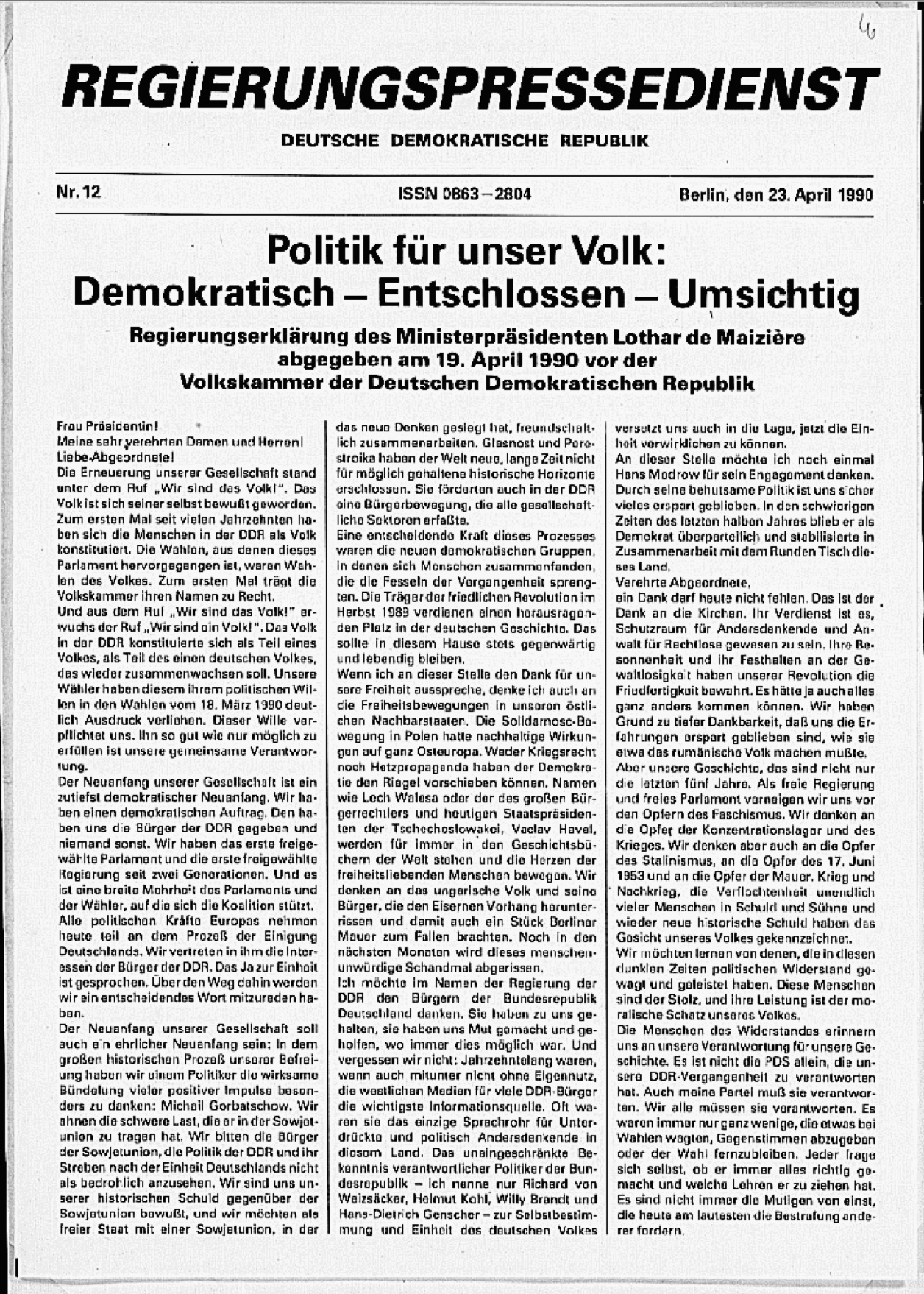
29
We consider a quick demilitarisation as a first step towards a non-violent society.
30
The means that would be set free in this way and the energies of the hundreds of thousands of young people who are thus far tied up in this expensive and unproductive profession could be put toward previously unimagined industrial, scientific, ecological and artistic advances.
With these energies our country will be free to step out of its social and economic crisis and to develop a culture that will make live richer. It will not have to join those societies that are geared solely towards the generation of profit.
With the knowledge and the experience of the profound process of change in the world of socialist countries we call on all good-willed people to take a brave step that exceeds all imagination as a sign of a triumph of reason.
The means that would be set free in this way and the energies of the hundreds of thousands of young people who are thus far tied up in this expensive and unproductive profession could be put toward previously unimagined industrial, scientific, ecological and artistic advances.
With these energies our country will be free to step out of its social and economic crisis and to develop a culture that will make live richer. It will not have to join those societies that are geared solely towards the generation of profit.
With the knowledge and the experience of the profound process of change in the world of socialist countries we call on all good-willed people to take a brave step that exceeds all imagination as a sign of a triumph of reason.
“Appeal of the 89”,
13 December 1989 (continued)
13 December 1989 (continued)
31
We have no more time – our only chance is to act together.
We have no more time – our only chance is to act together.
For infos on all contributors and references click HERE.
